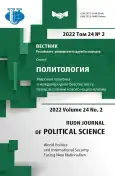Коалиция или оппозиция? Поведение регионалистских партий в многоуровневой конкуренции на примере Страны Басков и Шотландии
- Авторы: Белоус Ю.А.1, Тарасов А.С.2
-
Учреждения:
- Национальный исследовательский университет «Высшая школа экономики»
- Университет Тренто
- Выпуск: Том 24, № 2 (2022): Мировая политика и международная безопасность перед вызовами нового национализма
- Страницы: 317-330
- Раздел: РЕГИОНАЛЬНЫЙ ЭТНОНАЦИОНАЛИЗМ: КОНФЛИКТНЫЙ И КОАЛИЦИОННЫЙ ПОТЕНЦИАЛ
- URL: https://journal-vniispk.ru/2313-1438/article/view/322632
- DOI: https://doi.org/10.22363/2313-1438-2022-24-2-317-330
- ID: 322632
Цитировать
Полный текст
Аннотация
Цель исследования - сравнить поведение партий и выяснить, почему одни партии вступают в коалиции, а другие - нет. Определены особенности поведения двух регионалистских партий Соединенного Королевства и Испании: Шотландской национальной партии (ШНП) и Баскской национальной партии (БНП). Значимость исследования заключается в решении проблем позиционирования партий в децентрализованных системах с сильными регионалистскими элементами. На основе методологии «отслеживания процессов» («process tracing») и сравнительного анализа поведения основных региональных партий, электоральных данных, публичных заявлений, заявлений в СМИ авторы пришли к выводу, что идеологическая близость в экономическом измерении партий, территориальное измерение имеют ключевое значение для оценки коалиционного потенциала между центральными и регионалистскими партиями. Более того, выявлено, что уровень конкуренции на региональном уровне создает стимулы для регионалистских партий вступать в коалицию с центральными. Вместе с тем не выявляется очевидной поддержки того факта, что правительство меньшинства обладает большими возможностями по вступлению в коалицию по сравнению с правительством большинства.
Ключевые слова
Об авторах
Юлия Александровна Белоус
Национальный исследовательский университет «Высшая школа экономики»
Email: ybelous@hse.ru
ORCID iD: 0000-0002-0871-8223
аналитик Центра комплексных европейских и международных исследований, аспирант
Москва, Российская ФедерацияАндрей Сергеевич Тарасов
Университет Тренто
Автор, ответственный за переписку.
Email: andrei.tarasov@unitn.it
ORCID iD: 0000-0002-0200-8909
аспирант школы международных исследований, стажер-исследователь
Тренто, ИталияСписок литературы
- Alonso, S. (2012). Challenging the state: Devolution and the battle for partisan credibility: A comparison of Belgium, Italy, Spain, and the United Kingdom. Oxford University Press.
- Barrio, A., & Rodríguez-Teruel, J. (2017). Reducing the gap between leaders and voters? Elite polarization, outbidding competition, and the rise of secessionism in Catalonia. Ethnic and Racial Studies, 40(10), 1776-1794.
- Blarel, N., & Van Willigen, N. (2021). How do regional parties influence foreign policy? Insights from multilevel coalitional bargaining in India. European Journal of International Relations, 27(2), 478-500.
- Bullmann, U. (1996). The politics of the third level. Regional & Federal Studies, 6(2), 3-19. https://doi.org/10.1080/13597560802351655
- De la Granja, J., De Pablo Contreras, S., Pobes, C., & Olábarri Gortázar, I. (2020). Breve historia de Euskadi. De los Fueros a nuestros días. Barcelona: Grupo Penguin Random House. (In Spanish).
- Döring, H., & Hellström, J. (2013). Who gets into government? Coalition formation in European democracies. West European Politics, 36(4), 683-703. https://doi.org/10.1080/01402382.2013.783347
- Falcó-Gimeno, A., & Verge, T. (2013). Coalition trading in Spain: Explaining state-wide parties’ government formation strategies at the regional level. Regional & Federal Studies, 23(4), 387-405.
- Field, B. N. (2016). Why minority governments work: Multilevel territorial politics in Spain. Springer.
- Field, B. N., & Hamann, K. (2015). Framing legislative bills in parliament: Regional-nationalist parties’ strategies in Spain’s multinational democracy. Party Politics, 21(6), 900-911.
- Filippova, E. Y. (2021). Factors of coalitional governments formation between regionalist and nationwide political parties in regions of Spain. World Economy and International Relations, 65(4), 71-79. (In Russian).
- Grabevnik, M. V. (2021). Party strength of regionalist parties of United Kingdom: Conceptualisation and measuring. RUDN Journal of Political Science, 23(3), 463-478. (In Russian).
- Hooghe, L. (1996). Cohesion Policy and European Integration: Building Multi-level Governance. Oxford University Press.
- Jeram, S. (2014). Sub-state nationalism and immigration in Spain: Diversity and identity in Catalonia and the Basque Country. Ethnopolitics, 13(3), 225-244.
- Leon, S., & Jurado, I. (2020). Multilevel Governance in Spain. In D. Muro, I. Lago. (Eds.), The Oxford Handbook of Spanish Politics (pp. 224-240). Oxford: Oxford University Press.
- Marks, G. (1993). Structural Policy and Multilevel Governance in EU. In A. Cafruny, G. Rosental (Eds.), The State of the European Community: the Maastricht debate and beyond (pp. 391- 411). Boulder, CO: Lynne Rienner.
- Massetti, E. (2009). Explaining regionalist party positioning in a multi-dimensional ideological space: A framework for analysis. Regional and federal studies, 19(4-5), 501-531. https://doi. org/10.1080/13597560903310246
- Massetti, E., & Schakel, A. H. (2015). From class to region: How regionalist parties link (and subsume) left-right into centre-periphery politics. Party Politics, 21(6), 866-886.
- Mees, L. (2015). Nationalist politics at the crossroads: The Basque nationalist party and the challenge of sovereignty (1998-2014). Nationalism and Ethnic Politics, 21(1), 44-62. https://doi.org/10.1080/13537113.2015.1003487
- Schakel, A. (2020). Multi-level governance in a ‘Europe with the regions’. The British Journal of Politics and International Relations, 22(4), 767-775.
- Scottish National Party. (2021). Scotland’s Future. Scotland’s Choice. Manifesto 2021 [E-book]. https://issuu.com/hinksbrandwise/docs/04_15_snp_manifesto_2021___a4_document?mode=window
- Ştefuriuc, I. (2009). Government formation in multi-level settings: Spanish regional coalitions and the quest for vertical congruence. Party Politics, 15(1), 93-115.
- Stephenson, P. (2013). Twenty years of multi-level governance: ʻWhere does it come from? What is it? Where is it going?’ Journal of European Public Policy, 20(6), 817-837.
- Tronconi, F. (2015). Ethno-regionalist parties in regional government: Multilevel coalitional strategies in Italy and Spain. Government and Opposition, 50(4), 578-606.
Дополнительные файлы









